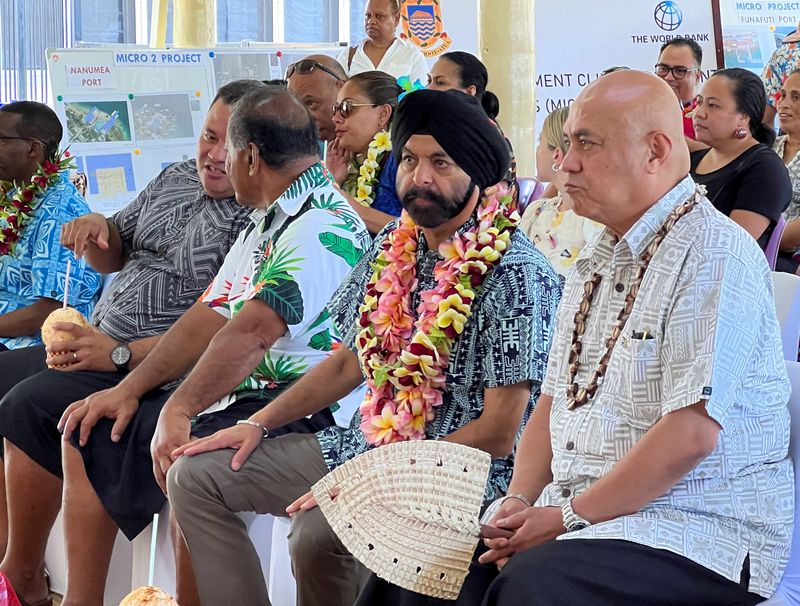By Kirsty Needham
FUNAFUTI, Tuvalu (Reuters) – World Financial institution President Ajay Banga mentioned on Friday that younger folks within the Pacific Island nation of Tuvalu want coaching to assist them transfer and adapt to local weather change as he visited the frontline of the battle towards rising sea ranges.
On the primary go to by a World Financial institution chief to Tuvalu – the place 11,00 folks reside on 26 sq. km (10 sq. miles) of land stretched throughout 9 atolls – the affect of the adjustments was clear, he mentioned, because the tiny nation fortified its ports and reclaimed coastal land.
Quickly after taking up the highest job in June final yr, Banga expanded the worldwide lender’s remit for the primary time in 80 years to embody local weather change, below the banner of assuaging poverty in a habitable planet.
Scientists say by 2050, half of Tuvalu’s fundamental city of Funafuti might be inundated by tides. A local weather migration deal struck with Australia final yr offers its inhabitants a pathway to maneuver when its atolls turn into uninhabitable.
Banga spoke to younger individuals who mentioned they instructed him leaving their residence was the “Plan B”.
The World Financial institution’s imaginative and prescient for a habitable planet was wider than bodily infrastructure, he mentioned in an interview with Reuters.
“It is also about human infrastructure,” he mentioned.
“Why should they not have education and health care when they are growing up? It’s not just a question of survival. It’s a question of quality of life.”
Banga mentioned he needed the World Financial institution to maneuver sooner, deal with affect, share its data with the Pacific islands and create jobs for younger folks.
In Tuvalu, this might imply investing in abilities institutes to offer younger individuals who face migrating to a different nation coaching as a nurse or plumber, he mentioned.
Talua Nivaga, vice chairman of the Tuvalu Nationwide Youth Council, mentioned local weather mobility “doesn’t mean that we are right now requiring this movement of people at this stage”.
“What we are advocating for is the clear path of people to move when it comes to worst case scenarios,” he mentioned.
He mentioned with Banga the abilities a local weather migrant may want.
“That skill would have been maintained in Tuvalu and first used for the benefit of our people,” he mentioned.
Since taking up the position simply over a yr in the past, Banga has visited each area the place the World Financial institution operates. The Pacific Islands nation of Tuvalu, inhabitants 11,000, is the final cease.
The World Financial institution mentioned in December it should deploy 45% of its annual financing to local weather change adaptation and mitigation by 2025. Within the Pacific Islands, that objective has already been reached, he mentioned.
Banga will use the platform of the United Nations Normal Meeting in New York this month to focus on reforms to the World Financial institution and urge wealthy nations to replenish funds to its Worldwide Improvement Affiliation (IDA), which helps the poorest nations, together with many within the Pacific Islands.
Tuvalu’s Deputy Prime Minister, Panapasi Nelesoni, mentioned on Friday that water inundation from sea degree rise makes it tougher to develop greens for meals, compounding well being issues.
“The IDA fund is very important because it is grants given to us. Right now it is difficult for us to borrow money and we like to see a continuation of that assistance from rich countries, given the problem we have with climate change,” he mentioned.
STAY OR GO?
Grace Malie, 25, one of many younger individuals who spoke with Banga, mentioned she learnt about local weather change on the age of eight as her mother and father defined why the area for playgrounds was shrinking.
She desires help for Tuvalu to adapt for so long as it may well. “I love my country, I love my home and I love doing what I do every day in Tuvalu and I wish to stay,” she mentioned.

Within the streets of Funafuti, IT employee Maani Maani, 32, mentioned his technology confronted a tough determination. Whereas somebody together with his abilities can get visas to work in locations like Australia, he apprehensive concerning the older folks left behind.
“Our mainland is getting thinner and thinner. Crops can’t grow well. I think God is not going to save us this time,” he mentioned.




